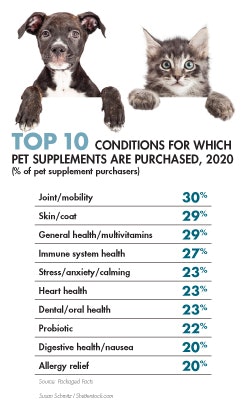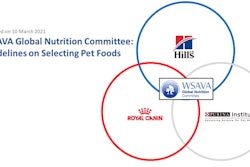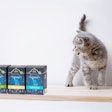
The COVID-19 pandemic has put health and wellness concerns front and center, with both human and pet health care markets as key beneficiaries. The spotlight on disease and prevention has sharpened pet owners’ focus on the overall health of their pets, with 41% of pet owners indicating that they are paying closer attention to their pets’ health and wellness because of COVID-19 and 14% changing the health care products they buy their pets, based on Packaged Facts’ November–December 2020 Survey of Pet Owners.
For the pet nutrition products industry, all of this attention to disease prevention and wellness means more pet owners are seeking out solutions to the health issues they are noticing while spending more time in closer contact with their pets. It also means that pet owners are thinking more proactively, looking for ways to head off health issues in the first place by taking preventative measures. This holds doubly true because, as noted in last month’s column, 55% of dog households and 53% of cat households have senior pets, with the senior share of the pet dog population up by 10 percentage points from 45% in 2014 to 55% in 2020.
Pet supplement market growth
With the increased focus on health and wellness brought on by the pandemic, the pet supplements market — including CBD products in particular — has been getting a lot of attention as pet owners seek out products that address common health problems, such as anxiety and pain-management products.
As of November–December 2020, pet supplement usage rates were at 38% among dog owners and 19% among cat owners, up from 29% and 17% in spring 2019. Reflecting the heightened interest is a 21% surge in pet supplement sales — quadrupling the average annual increase of the past five years — bringing 2020 sales to nearly US$800 million, as reported in Packaged Facts’ Pet Supplements in the U.S. (January 2021). Given their consumer reputation as strong preventive medicine, not to mention the fact that they don’t require prescriptions, the pet supplement market’s growth is easy to understand.
Confirming the role of COVID-19 in pumping up sales is avid demand for products targeting immunity and anxiety, with joint/mobility, skin/coat, dental and probiotic supplements perennially popular (see Table 1), and with CBD supplements hotter than ever. The ongoing and residual impact of the pandemic, the strong prospects and “halo effect” of CBD on the pet supplements business, the large numbers of senior and overweight pets, and the overall pet industry spotlight on pet health are expected to keep pet supplements on a steady upward trajectory, with sales topping US$900 million by 2025.

TABLE 1: The top three issues that have pet owners looking to supplements are joint/mobility, skin/coat and general health. | Susan Schmitz I Shutterstock.com
Pet owners are also turning to pet treats for assistance with health issues. Packaged Facts’ February 2021 Survey of Pet Owners shows that functional pet treats (excluding dental chews/treats) draw 21% of dog product shoppers and 17% of cat product shoppers. Dozens of companies field functional treats for dogs and cats, and as is the case with pet food, veterinary themes are playing a growing role, as seen in Purina Pro Plan Veterinary Diets Gentle Snackers, which are sold not just through veterinarians but also on Amazon.com.


















